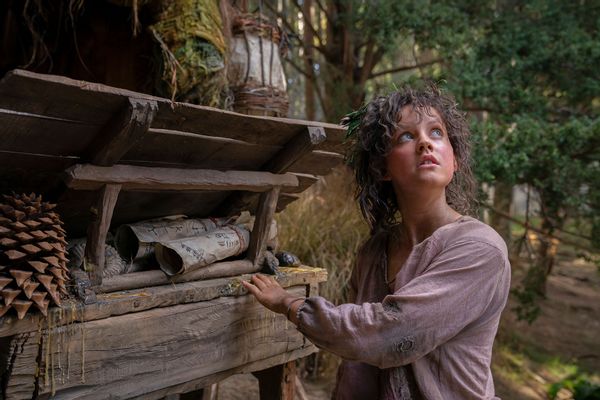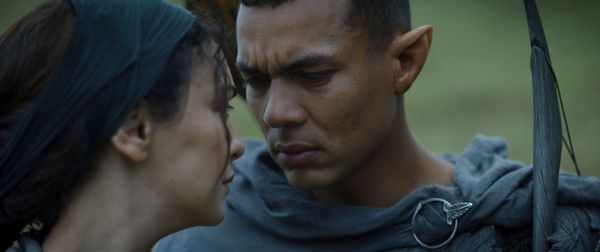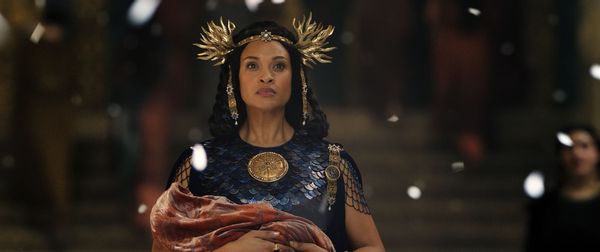
Prince and Michael Jackson were rivals. Pop music superfans know this, even if they don't necessarily agree on whether that competitive relationship was friendly or bitter. Knowing that doesn't change either legend's status or artistic worth. Yet while they were alive, some were compelled to treat their careers as if they were in constant competition, with one performer's success somehow costing the other. But the average person only cares if their music is good, which it is.
This is analogous to the discussion surrounding the long-awaited debut of "The Lord of the Rings: The Rings of Power," Jeff Bezos' titanic play to secure a must-see franchise for Amazon's streaming service. In a move influenced by the worldwide success of "Game of Thrones," he tossed a reported $250 million to J.R.R. Tolkien's estate simply to secure the rights back in 2017 – a full two years before HBO's dragon-powered juggernaut went off the air.
Not to be outdone, a year later HBO responded by announcing it was developing an adaptation of "Fire & Blood" that manifested as "Thrones" prequel "House of the Dragon," whose recent debut drew the largest audience for any new original series HBO's history.
In addition to its still-potent brand recognition, "House of the Dragon" strategically leans on name familiarity in focusing on the Targaryen dynasty at its height. This guarantees regular ganders at their fire-breathing pets along with Matt Smith, still beloved for his tenure on "Doctor Who."
What HBO doesn't have is Amazon money to blow on each "House of the Dragon" episode, which you can tell by looking at the details that went into the sets. Expenses, you might say, were spared.
High fantasy enthusiasts find themselves in the rare position of being treated to two epic series at once. Why choose? They – we – will not.
Meanwhile, Bezos poured at least another $465 million on the first eight episodes of "The Rings of Power," and you can see those dollars glittering in the ornate costumes, elaborately built sets, and exquisite effects. The New Zealand fields and forests look as gorgeous as ever, as does everyone walking in them who isn't an orc or a brown-toothed peasant.
Their cha-ching resounds in the score, too: Ramin Djawadi has created some of the most infectious and haunting bodies of music in genre fiction with his Westeros themes and songs, which means the only way to match that is to hire Howard Shore, who scored Peter Jackson's movies, to write the theme and Bear McCreary ("Outlander," "Battlestar Galactica") to dream up the episodic music.
All of this translates to a veritable mountain horde of riches for high fantasy enthusiasts, who find themselves in the rare position of being treated to two epic series at once. Why choose? They – we – will not.
"The Rings of Power" is virtually review proof. Amazon's executives are confident about that, proven by the company's five-season commitment before the premiere, along with the blink-and-you'll-miss-it review window for the two episodes given to critics.
That sliver of a viewing opportunity was enough to provide a sense of the production's massive scale and to beget in the viewer a sense of caution. This is a series that demands patience and a long memory and presumes our trust that its extensive atmosphere establishment and world-building is leading to someplace worthwhile.
That assumption isn't misplaced, judging by the resilient adoration for Jackson's "Lord of the Rings" trilogy two decades after "The Fellowship of the Ring" and "The Two Towers" hit theaters and, along with "The Return of the King," went to on gross over $6 billion worldwide and win 17 Academy Awards. The Starks, Lannisters, and Targaryens were unknown factors when "Game of Thrones" debuts, but everybody knows what hobbits are – although here, we meet Frodo and Bilbo's distant ancestors, the Harfoots.

"The Rings of Power" takes place thousands of years before the Harfoots descendants became synonymous with The Shire or Bree, allowing showrunners J.D. Payne and Patrick McKay to lead us to new lands such as Lindon, the capital city of the elves, and Númenor, the island kingdom that represents the height of human glory. The dwarves' underground mines are populated and boisterous.
Payne and McKay take full advantage of Middle-earth's expansiveness by taking their time to acquaint us with figures we've never met before, several of whom don't appear in its opening pair of episodes. They can do that because their narrative's arsenal features names that don't require an introduction, including Sauron, Isildur, Elrond (Robert Aramayo, who played Young Eddard Stark), and the queen elf herself, Galadriel (Morfydd Clark).
This Galadriel is not the cosmically attuned sylph we know from the films. Clark's intense and driven incarnation is younger by several millennia and a terse warrior devoted to a hunt the rest of her people have given up on, pursuing Sauron in the world's most distant corners. Sauron represents the last remnant of an evil incursion that spread over the sea to the elves' homeland of Valinor, bringing a wave of them to Middle-earth to beat back the darkness.
Humans wish they would leave, and many of the elves agree that the time of war is over. But we all know from Cate Blanchett's narration in the "Fellowship" opening credits that the land's troubles are only beginning.

"The Rings of Power" is a painstaking construction on every level, evident in its inclusive casting. Middle-earth is represented by a variety of hues: there are brown-skinned Harfoots and a Black dwarf princess (played by British-born African/Iranian actor Sophia Nomvete). A future episode introduces a human queen regent (Cynthia Addai-Robinson).
Jackson's Tolkien adaptations gave rise to the unspoken requirement that there must be a hot elf to lust after; here, that task falls to Arondir, played with smolder by Puerto Rican actor Ismael Cruz Córdova. And adventuring isn't primarily left to the males of each people; this time a daring female Harfoot, Nori Brandyfoot (Markella Kavenagh), pushes beyond the simple life expected of her, not one of her brethren.
At least the series' directors [and showrunners] are embracing a more enlightened vision of what Tolkien's world can and should look like.
But there's still a hierarchy at work as seen in which the characters receive prominent focus.
While Arondir patrols the hamlets, the circles Galadriel runs in are populated by super-blondes who, in one scene, break into song as if they were a pointed-eared version of the Mormon Tabernacle Choir. Granted, Tolkien delineates classist distinctions within elven society, but still – old habits die hard.
At least Payne and McKay and the series' directors J.A. Bayona, Charlotte Brändström, and Wayne Che Yip are embracing a more enlightened vision of what Tolkien's world can and should look like. Those details only augment the authenticity of a place some people think of as an extension of our world.

Having said that, the directors know that viewers are looking for this series to match the spectacle of the films, which it does early on in a dramatic prologue to the first title summing up the first major battle for Middle-earth, obligatory (and jaw-slackening) giant eagle cameo included.
From there The Rings of Power" sets about weaving together plots taken from the various appendices accompanying Tolkien's "Lord of the Rings" texts, giving the writers some license in terms of developing subplots and expanding screen time for certain breakout characters. What remains to be seen is whether they'll take that chance or wed the show's spirit more completely to that of the movie trilogy.
This is the difficult task falling to "The Rings of Power" – besides meeting the business-related expectations assigned to it, of course. In an environment where TV producers insist on trying to sell the audience on the gravitas of their work by insisting their show isn't a show but more like a 10-hour movie, here is a project whose quest is to take a story most successfully adapted as movies and make the plot work in an episodic form. (Prime Video's decision to drop installments weekly should help that aim .)
That may be why the opening episodes, for all their extravagance, move with a choreographed tightness. The same observation was made about the King of Pop, especially when comparing him to Prince, who couldn't match his moves but was a superior composer and instrumentalist. Both were reliably marvelous performers, even if one emphasized technically precise dazzle the people while the other excelled in constantly surprising us.
If the same can be said by the close of the freshman season of "The Rings of Power" that means nothing but victory for the audience even if it takes its time getting us there, let alone back again.
"The Lord of the Rings: The Rings of Power" premieres two back-to-back episodes Thursday, Sept. 1 at 6 p.m. PT/ 9 p.m. ET on Prime Video. New episodes debut weekly.







